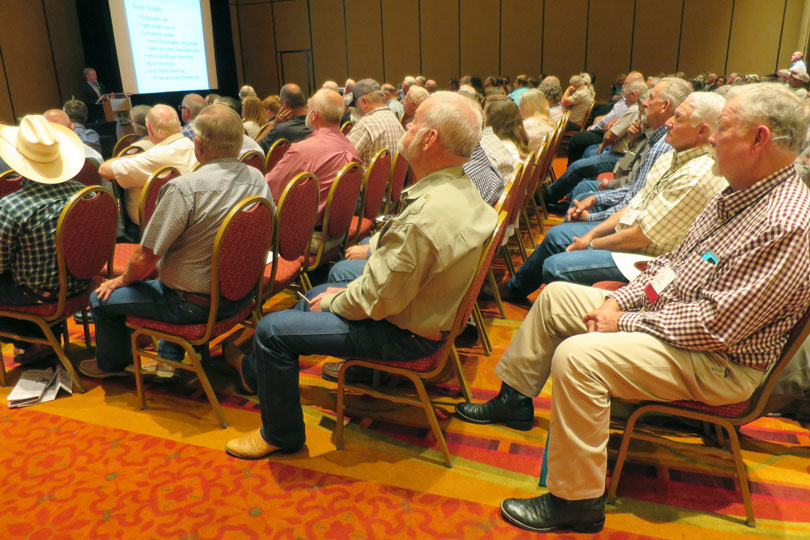By Jennifer Dorsett
Field Editor
Legislative updates, hemp and fake meat were among the topics highlighted during the Texas Farm Bureau (TFB) Summer Leadership Conference.
Nearly 500 farmers and ranchers were in San Marcos, June 24-26, for the meeting.
86th Texas Legislature recap
TFB President Russell Boening discussed eminent domain reform efforts during the legislative session. Although SB 421—the bill aimed at reforming the state’s eminent domain process—did not pass, Boening said the fight was not over.
“We did not lose on eminent domain. We learned. In life, you either win or you learn. We learned, and Texas Farm Bureau came out of this session with its credibility unblemished. We maintained our reputation for reason and common sense,” Boening said. “You are not defeated until you quit, and there is no quit in Farm Bureau.”
TFB Government Affairs staff discussed legislative wins during a panel discussion. Several of TFB’s legislative priorities, including funding for the Texas Tech University Veterinary School of Medicine and the restoration of the Texas Department of Agriculture’s (TDA) unexpended balance authority, were signed into law by Gov. Greg Abbott.
Many other TFB-supported bills were passed, and several opposed by TFB were not made into law.
More information on the bills is available at texasfarmbureau.org/advocacy/austin-newsletter.
Hemp
Texas farmers will now be able to grow industrial hemp after receiving legislative approval this session.
Jeff Lake of Elemental Processing discussed the growing, harvesting and processing steps for the crop.
Elemental Processing recently purchased an old caffeine-extraction facility in Houston, and it plans to convert it into a cannabidiol (CBD)-extraction facility, Lake said.
Lake provided an overview of the three types of hemp: grain, fiber and flower.
Grain, or seed hemp, contains no cannabinoids and is grown for seed production. The seeds can be processed into protein for use in food and nutraceuticals.
Fiber hemp is tall and looks somewhat like bamboo, Lake said, and is used for rope and textile purposes.
The third type, flowering hemp, is used in the production of CBD oil and is what Lake’s company grows and processes. The flowers contain several cannabinoids and can be harvested, dried and processed for a variety of uses.
Seed genetics will play an enormous role in whether a crop is profitable or not, Lake noted.
As of right now, there is no federally-certified hemp seed available, and good genetics are fairly expensive. Seed also must be feminized to exclude male plants or pollination will occur, devaluing flower hemp and lowering quality.
Feminized, quality hemp seed is fairly expensive at costs of around $1 per seed, according to Lake, with seed rates of anywhere from 2,000 to 5,000 seeds per acre.
But Lake said he expects costs to decrease as more farmers grow hemp and more processors are established in the coming years.
Fake meat
Alternative proteins have made national news, generating concern among the beef industry about regulations and market share.
“At NCBA, we have a membership-driven policy aimed at protecting the definition of beef,” National Cattlemen’s Beef Association’s (NCBA) Senior Director of Government Affairs Danielle Beck said. “We must do everything we can to uphold that standard.”
Actions are being taken to regulate fake meat, she said, but ranchers also need to advocate within their communities and on social media to raise awareness.
Trade
About 20 percent of U.S. farm income is from trade, U.S. Deputy Secretary of Agriculture Stephen Censky said during an overview of the country’s agricultural trade situation.
Trade talks with Japan are promising, according to Censky.
He advised the crowd to urge lawmakers to ratify the U.S.-Mexico-Canada-Agreement (USMCA), because the trade deal is key to providing stability for farmers and ranchers.
“The good news is that USMCA not only does no harm to U.S. agriculture, but it improves on NAFTA,” Censky said. “We will have greater market access—particularly into Canada—on our dairy and wheat.”

